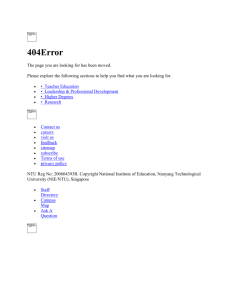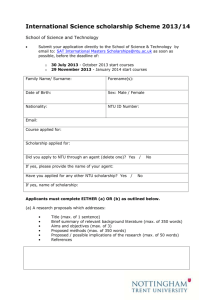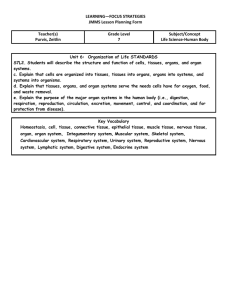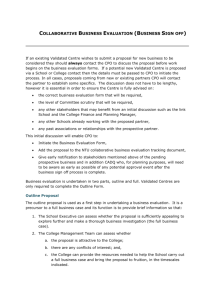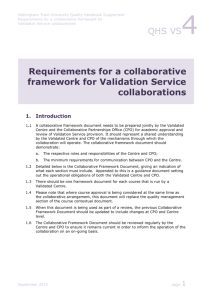Version - Jan 2010 Nottingham Trent University Course
advertisement
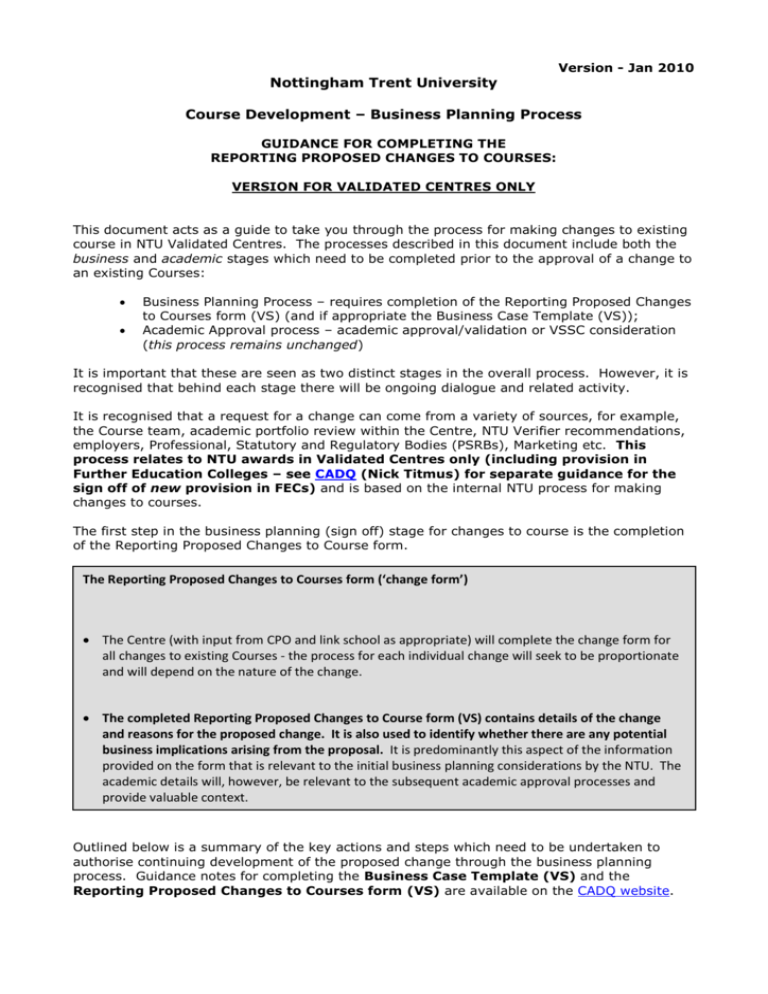
Nottingham Trent University Version - Jan 2010 Course Development – Business Planning Process GUIDANCE FOR COMPLETING THE REPORTING PROPOSED CHANGES TO COURSES: VERSION FOR VALIDATED CENTRES ONLY This document acts as a guide to take you through the process for making changes to existing course in NTU Validated Centres. The processes described in this document include both the business and academic stages which need to be completed prior to the approval of a change to an existing Courses: Business Planning Process – requires completion of the Reporting Proposed Changes to Courses form (VS) (and if appropriate the Business Case Template (VS)); Academic Approval process – academic approval/validation or VSSC consideration (this process remains unchanged) It is important that these are seen as two distinct stages in the overall process. However, it is recognised that behind each stage there will be ongoing dialogue and related activity. It is recognised that a request for a change can come from a variety of sources, for example, the Course team, academic portfolio review within the Centre, NTU Verifier recommendations, employers, Professional, Statutory and Regulatory Bodies (PSRBs), Marketing etc. This process relates to NTU awards in Validated Centres only (including provision in Further Education Colleges – see CADQ (Nick Titmus) for separate guidance for the sign off of new provision in FECs) and is based on the internal NTU process for making changes to courses. The first step in the business planning (sign off) stage for changes to course is the completion of the Reporting Proposed Changes to Course form. The Reporting Proposed Changes to Courses form (‘change form’) The Centre (with input from CPO and link school as appropriate) will complete the change form for all changes to existing Courses - the process for each individual change will seek to be proportionate and will depend on the nature of the change. The completed Reporting Proposed Changes to Course form (VS) contains details of the change and reasons for the proposed change. It is also used to identify whether there are any potential business implications arising from the proposal. It is predominantly this aspect of the information provided on the form that is relevant to the initial business planning considerations by the NTU. The academic details will, however, be relevant to the subsequent academic approval processes and provide valuable context. Outlined below is a summary of the key actions and steps which need to be undertaken to authorise continuing development of the proposed change through the business planning process. Guidance notes for completing the Business Case Template (VS) and the Reporting Proposed Changes to Courses form (VS) are available on the CADQ website. The stages in the making changes to course process are: ° Stage 1 – Reporting Proposed Changes to Course form (VS) ° Stage 2 – The Business Case1 ° Stage 3 – Academic Approval Additional information and guidance: You are referred to ASQH Sections 10, 3 and 4 where guidance is provided for drafting the academic approval documentation. Of particular relevance to changes to existing Courses, please see section 10 for Collaborative Provision and Section 4, Appendix 4.1: “Making changes to Coursess” – Appendix 4.1 contains further clarification relating to the type of changes (Major/Modification/Minor Modification). A simplified flow diagram of the making changes process for Validated Centres can be found below. 1 If a change does not include identified business implications (finance, marketing or resource) the process of sign off will reflect this and a Business Case may not be needed. Course Development – Business Planning Process REPORTING PROPOSED CHANGES TO COURSE FORM (‘CHANGE FORM’) VERSION FOR VALIDATED CENTRES ONLY The need to make a change to an existing course identified by the Centre Centre informs CPO that they wish to make a change to an existing course CPO provides Centre with change form and supporting guidance. Centre (with support from CPO and link NTU school if appropriate) completes the change form Business implications identified Business Case Template (VS) needed Centre, CPO and link school complete BCT (VS) See guidance for completion of BCT (VS) CPO receives and considers the completed change form No business implications identified CPO and link NTU school sign off change form (and BCT (VS) if appropriate) CADQ Officer allocated to the academic approval and confirms academic approval documentation requirements and timescales with Centre Academic approval (validation event / VSSC) If at any point in the process the sign off is unsuccessful, CPO and the link NTU school will provide feedback – this may include recommendations for amendments and re-submission. Course Development - Business Planning Process Making Changes to Existing Course and Sign-off stages (Validation Service only) (including supporting information on academic approval) BUSINESS PLANNING PROCESS Key Stages: 1: Proposal for Change to an Existing Course (VS only) - initial course and NTU process Once the Course Team/Centre have identified and agreed the need to make a change to an existing VS Course: The Course Team/Centre notify to CPO that they are intending to make a change to an existing (validated) Courses(s); Preliminary discussions take place between the Course Team, CPO and CADQ to agree the nature of the change and identify any potential business implications; CPO ensures that the Course Team/Centre has the Reporting Proposed Changes to Course form (VS) and guidance to allow business sign off to progress. CPO provides feedback to Course Team if proposal does not progress beyond this point; Section 1-5 of the Reporting Proposed Changes to Course form (VS) is then completed by Centre (with input from CPO and NTU link school if appropriate); On receipt of the completed Reporting Proposed Changes to Course form (VS) (sections 1-5), CPO confirms the nature of the change (and therefore the required actions) and gives agreement/sign off in principle (this is not the final business planning sign off). CPO provides feedback to Centre if proposal does not progress - if additional clarification is required the form may be re-worked and reconsidered again; The outcome of the initial considerations and nature of the change should be logged on the Reporting Proposed Changes to Course form (VS) by CPO. 2: The Business Case Once the Course level stages have been completed and the outcome has been noted by CPO, one of two courses of action need to be followed (depending of the nature of the change and whether any business implications have been identified – see Appendix A below for further guidance on the types of changes): (i). Major changes2 or where initial considerations by the NTU link school and CPO have identified potential business implications associated with the proposed change to an existing course: 2 Major Changes as defined in the ASQH The Course Team/Centre, with input from CPO and link NTU school complete the Business Case Template (VS); The completed Business Case Template (VS) and completed Reporting Proposed Changes to Course (VS) forms are reviewed by CPO and the link school and considered for business planning sign off; The outcome of the business planning process is logged on the Reporting Proposed Changes to Course form (VS) and BCT(VS) by CPO; If the business planning sign off is successful, a CADQ Officer is allocated to the proposal and the academic approval route is agreed (either panel event or consideration by the NTU Validation Service Sub Committee (VSSC). OR (ii). Modifications/Minor modifications3 where no business implications have been identified: CPO and NTU link school review the completed Reporting Proposed Changes to Course (VS) form and reconfirm that there are no business implications; The outcome of the business planning process is logged on the Reporting Proposed Changes to Course form (VS) by CPO; A CADQ Officer is allocated to the proposal and the academic approval route is agreed (either panel event or consideration by the NTU Validation Service Sub Committee (VSSC)4). If at any point in this process a proposal may be referred back to the Centre for additional clarification or further documentation/information. CPO will provide feedback as required. 3: Academic Approval At whatever stage the business planning and Business Case considerations have been completed and signed off successfully, the academic approval process will then apply. The academic approval process is detailed in Section 10 (collaborative provision) and Section 4 (Appendix 4.1) of the ASQH. The process to be followed is determined by the nature of the change. For a Major Change the academic approval will involve either consideration by VSSC or an academic approval panel. For a Modification or Minor Modification it is likely that most proposals will be considered at VSSC (where there are business implications or a large number of smaller changes it might be appropriate to seek approval via an academic approval event). Documentation requirements for academic approval remain unchanged. The Reporting Proposed Changes to Course form (VS) should only be used to supplement the academic approval documentation. Further guidance will be available from your CADQ Officer. 3 4 Modifications and Minor Modifications as defined in the ASQH In most cases, Modifications and Minor Modifications will be considered by VSSC. Nottingham Trent University Course Development – Business Planning Process REPORTING PROPOSED CHANGES TO COURSE FORM: VERSION FOR VALIDATED CENTRES ONLY This form is to be used for business planning sign off and as such should contain relevant information linked to business considerations within the Centre, NTU School and/or NTU College and provide outline information on the proposed change. Once the business planning sign off has been completed, academic approval documentation will be required as per the NTU ASQH. Where possible, sections 1-4 should be completed by the Course Team/Centre. Sections 5-8 will be completed within NTU. 1. Award and Course title(s): (please add additional rows if required) Enter the full award and Course titles here of all the Course included in the proposed change. This form should only be used for changes to existing VS Courses. Guidelines for completing the form Please see related guidance on the functions of this form and how to complete it (Guidance: Reporting proposed changes to Course – Validated Centres). The form should be completed by the relevant Course Leader in the Centre and then considered by NTU (School budget holder/CPO). Academic Approval follows this process. 2a. Brief description of the proposed change: Provide a brief description of the proposed change, for example, that the Centre wishes to change the title of the course or that the Centre wishes to change the assessment in four modules and the learning outcomes in two. 2b. Reason(s) for proposed change: Provide a brief statement that explains why the changes are being proposed. 2c. Describe any potential business implications: (If there are none please indicate this here – business implications include resources (physical and human), marketing and financial implications) The Course Team/Centre (with support from CPO) is asked to identify any potential business implications. For example, a new module may require a new member of staff, new library resources or teaching facilities. These items should be identified here. 3. Description of all changes to modules included in the proposed change: Provide a brief outline here of the changes proposed to modules (rather than the course). (If there are none please indicate this here.) 3a. Changes at module level – overview: Please complete the following (add additional rows as required). Module code and title: Include the full module title (and module code if known). Level: Include the level of the module. E.g. 2 Credit points: Status: Add the number of NTU credits e.g. 30 State either that this module is in approval or is new Core/Option: (Approved/ New) Indicate if this is a core or optional module on the course 3b. Changes at module level – precise details of changes: Please complete following (add additional rows as required). Module code and title: Include the full module title (and module code if known). Applies to all Courses in section 1 (‘All’)/or list Courses title Indicate if the change to this module impacts on all courses listed in section 1 or name the courses. Precise details of changes: Provide precise, succinct details of the proposed changes to this module. 3c. Consultation Process Please provide information about the consultation process undertaken (there should be evidence of appropriate consultation with students, external examiners, peers and other stakeholders including the NTU Verifier): Provide a brief statement here about the consultation that has taken place prior to the completion of this form with a range of key stakeholders including the NTU Verifier. 4. ACADEMIC YEAR State the academic year that the proposed change will be implemented: State the academic year in which the changes will be implemented. 5. DATE INITIAL PROPOSAL SIGNED OFF BY COURSE COMMITTEE AT THE CENTRE Date: Add the date here Sign and print name: Provide the name of the Chair of the Courses Committee that considered this change form prior to submission to NTU/CPO (Chair of Courses Committee) For completion by CPO only: 6. DATE CHANGE FORM AND BUSINESS IMPLICATIONS SIGNED OFF BY NTU (IF APPLICABLE): Date: Add the date here Sign and print name: Indicate here who (in NTU) signed off the BCT and change forms to move forward to academic approval. Note any business implications identified: CPO should note any business implications here – this may need to be picked up during the academic approval process or separately by CPO.. Note the outcome of NTU/CPO consideration of the BCT and change form. Note outcome of NTU consideration: 7. RECORD OF CHANGE FORM AND BUSINESS CASE TEMPLATE SIGN OFF: Date change form received by NTU: If Business Case Template needed, date outline BCT considered by NTU and note outcome of consideration: If Full Business Case Template needed, date presented to NTU and outcome: Date: Comments/decision: Add the date here Add the date here Date received by CPO is recorded here with any comments Date received by CPO is recorded here with any comments Add the date here Date received by CPO is recorded here with any comments (or note that BCT not needed) 8. RECORD OF ACADEMIC APPROVAL Method of academic approval (panel event/sub-committee): Date and outcome of academic approval: Date: Comments/decision: Add the date here Add the date here Note method of academic approval – VSSC/validation event Note the outcome of academic approval here (full information will be available in the report) Nature of change Major Change proposed: Revised documentation received: Verifier has received revised documentation: Modification Yes Yes Minor Modification No No
